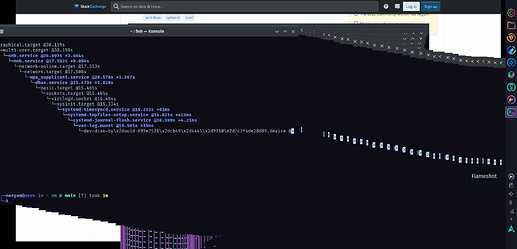So for some context, my system was a sluggish and ocasionally, it would be very slow and unresponsive so i decided to follow this guide. After changing my kernel to LTS with this tutorial, i've noticed that when i move a window in kde it's like it becomes a gigant brush, i really don't know how to describe it better.
System:
Kernel: 5.15.76-1-lts arch: x86_64 bits: 64 compiler: gcc v: 12.2.0
parameters: BOOT_IMAGE=/@/boot/vmlinuz-linux-lts
root=UUID=699e7526-cb49-4445-9710-7c7f4de28d89 rw rootflags=subvol=@
quiet quiet rd.udev.log_priority=3 vt.global_cursor_default=0 loglevel=3
Desktop: KDE Plasma v: 5.26.2 tk: Qt v: 5.15.7 wm: kwin_x11 vt: 1
dm: SDDM Distro: Garuda Linux base: Arch Linux
Machine:
Type: Laptop System: Dell product: Inspiron 15-5578 v: N/A
serial: <superuser required> Chassis: type: 9 serial: <superuser required>
Mobo: Dell model: 0P380W v: A00 serial: <superuser required> UEFI: Dell
v: 1.30.1 date: 05/27/2020
Battery:
ID-1: BAT0 charge: 30.7 Wh (100.0%) condition: 30.7/39.9 Wh (76.9%)
volts: 12.9 min: 11.4 model: SMP DELL 35RH35C type: Li-ion serial: <filter>
status: full
CPU:
Info: model: Intel Core i7-7500U bits: 64 type: MT MCP
arch: Amber/Kaby Lake note: check gen: core 7 level: v3 note: check
built: 2017 process: Intel 14nm family: 6 model-id: 0x8E (142)
stepping: 9 microcode: 0xF0
Topology: cpus: 1x cores: 2 tpc: 2 threads: 4 smt: enabled cache:
L1: 128 KiB desc: d-2x32 KiB; i-2x32 KiB L2: 512 KiB desc: 2x256 KiB
L3: 4 MiB desc: 1x4 MiB
Speed (MHz): avg: 594 high: 603 min/max: 400/3500 scaling:
driver: intel_pstate governor: powersave cores: 1: 577 2: 600 3: 599 4: 603
bogomips: 23199
Flags: avx avx2 ht lm nx pae sse sse2 sse3 sse4_1 sse4_2 ssse3 vmx
Vulnerabilities:
Type: itlb_multihit status: KVM: Split huge pages
Type: l1tf mitigation: PTE Inversion; VMX: conditional cache flushes, SMT
vulnerable
Type: mds mitigation: Clear CPU buffers; SMT vulnerable
Type: meltdown mitigation: PTI
Type: mmio_stale_data mitigation: Clear CPU buffers; SMT vulnerable
Type: retbleed mitigation: IBRS
Type: spec_store_bypass mitigation: Speculative Store Bypass disabled via
prctl and seccomp
Type: spectre_v1 mitigation: usercopy/swapgs barriers and __user pointer
sanitization
Type: spectre_v2 mitigation: IBRS, IBPB: conditional, RSB filling,
PBRSB-eIBRS: Not affected
Type: srbds mitigation: Microcode
Type: tsx_async_abort status: Not affected
Graphics:
Device-1: Intel HD Graphics 620 vendor: Dell driver: i915 v: kernel
arch: Gen-9.5 process: Intel 14nm built: 2016-20 ports: active: eDP-1
empty: HDMI-A-1 bus-ID: 00:02.0 chip-ID: 8086:5916 class-ID: 0300
Device-2: Realtek Integrated_Webcam_HD type: USB driver: uvcvideo
bus-ID: 1-5:4 chip-ID: 0bda:58c6 class-ID: 0e02 serial: <filter>
Display: x11 server: X.Org v: 21.1.4 with: Xwayland v: 22.1.4
compositor: kwin_x11 driver: X: loaded: modesetting
alternate: fbdev,intel,vesa dri: iris gpu: i915 display-ID: :0 screens: 1
Screen-1: 0 s-res: 1920x1080 s-dpi: 96 s-size: 508x285mm (20.00x11.22")
s-diag: 582mm (22.93")
Monitor-1: eDP-1 model: AU Optronics 0x10ed built: 2016 res: 1920x1080
hz: 60 dpi: 142 gamma: 1.2 size: 344x193mm (13.54x7.6") diag: 394mm (15.5")
ratio: 16:9 modes: 1920x1080
OpenGL: renderer: Mesa Intel HD Graphics 620 (KBL GT2) v: 4.6 Mesa 22.2.1
direct render: Yes
Audio:
Device-1: Intel Sunrise Point-LP HD Audio vendor: Dell
driver: snd_hda_intel v: kernel alternate: snd_soc_skl bus-ID: 00:1f.3
chip-ID: 8086:9d71 class-ID: 0403
Sound API: ALSA v: k5.15.76-1-lts running: yes
Sound Server-1: PulseAudio v: 16.1 running: no
Sound Server-2: PipeWire v: 0.3.59 running: yes
Network:
Device-1: Intel Wireless 3165 driver: iwlwifi v: kernel pcie: gen: 1
speed: 2.5 GT/s lanes: 1 bus-ID: 01:00.0 chip-ID: 8086:3165 class-ID: 0280
IF: wlp1s0 state: up mac: <filter>
IF-ID-1: virbr0 state: up speed: 10 Mbps duplex: unknown mac: <filter>
IF-ID-2: vnet0 state: unknown speed: 10 Mbps duplex: full mac: <filter>
Bluetooth:
Device-1: Intel Bluetooth wireless interface type: USB driver: btusb v: 0.8
bus-ID: 1-6:5 chip-ID: 8087:0a2a class-ID: e001
Report: bt-adapter ID: hci0 rfk-id: 0 state: up address: <filter>
Drives:
Local Storage: total: 298.09 GiB used: 92.49 GiB (31.0%)
SMART Message: Unable to run smartctl. Root privileges required.
ID-1: /dev/sda maj-min: 8:0 vendor: Toshiba model: MK3275GSX
size: 298.09 GiB block-size: physical: 4096 B logical: 512 B
speed: 3.0 Gb/s type: HDD rpm: 5400 serial: <filter> rev: 1D scheme: GPT
Partition:
ID-1: / raw-size: 297.79 GiB size: 297.79 GiB (100.00%) used: 92.49 GiB
(31.1%) fs: btrfs dev: /dev/sda2 maj-min: 8:2
ID-2: /boot/efi raw-size: 300 MiB size: 299.4 MiB (99.80%) used: 624 KiB
(0.2%) fs: vfat dev: /dev/sda1 maj-min: 8:1
ID-3: /home raw-size: 297.79 GiB size: 297.79 GiB (100.00%) used: 92.49
GiB (31.1%) fs: btrfs dev: /dev/sda2 maj-min: 8:2
ID-4: /var/log raw-size: 297.79 GiB size: 297.79 GiB (100.00%) used: 92.49
GiB (31.1%) fs: btrfs dev: /dev/sda2 maj-min: 8:2
ID-5: /var/tmp raw-size: 297.79 GiB size: 297.79 GiB (100.00%) used: 92.49
GiB (31.1%) fs: btrfs dev: /dev/sda2 maj-min: 8:2
Swap:
Kernel: swappiness: 133 (default 60) cache-pressure: 100 (default)
ID-1: swap-1 type: zram size: 7.63 GiB used: 950.5 MiB (12.2%)
priority: 100 dev: /dev/zram0
Sensors:
System Temperatures: cpu: 49.0 C pch: 49.0 C mobo: 49.0 C sodimm: SODIMM C
Fan Speeds (RPM): cpu: 0
Info:
Processes: 211 Uptime: 19m wakeups: 1 Memory: 7.63 GiB used: 3.83 GiB
(50.2%) Init: systemd v: 251 default: graphical tool: systemctl
Compilers: gcc: 12.2.0 Packages: 1485 pm: pacman pkgs: 1474 libs: 366
tools: paru,yay pm: flatpak pkgs: 11 Shell: fish v: 3.5.1 default: Bash
v: 5.1.16 running-in: konsole inxi: 3.3.22
Garuda (2.6.9-1):
System install date: 2022-10-04
Last full system update: 2022-11-02
Is partially upgraded: No
Relevant software: NetworkManager
Windows dual boot: No/Undetected
Snapshots: Snapper
Failed units: dev-binderfs.mount
